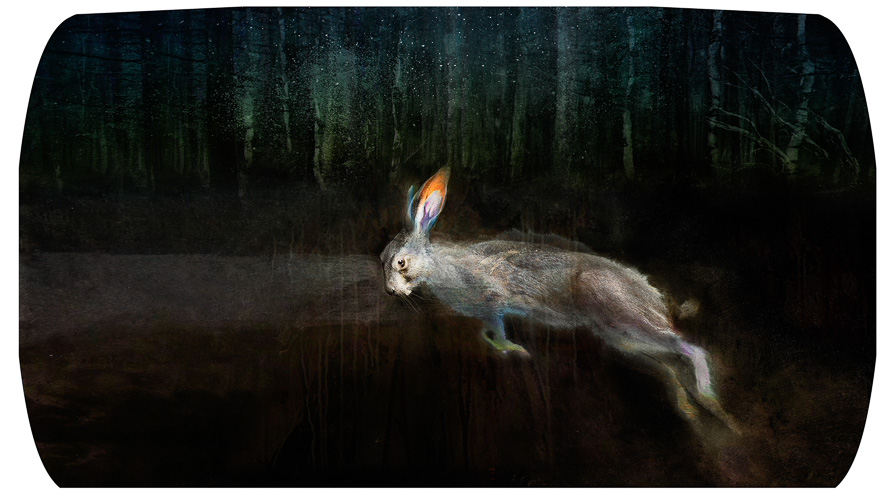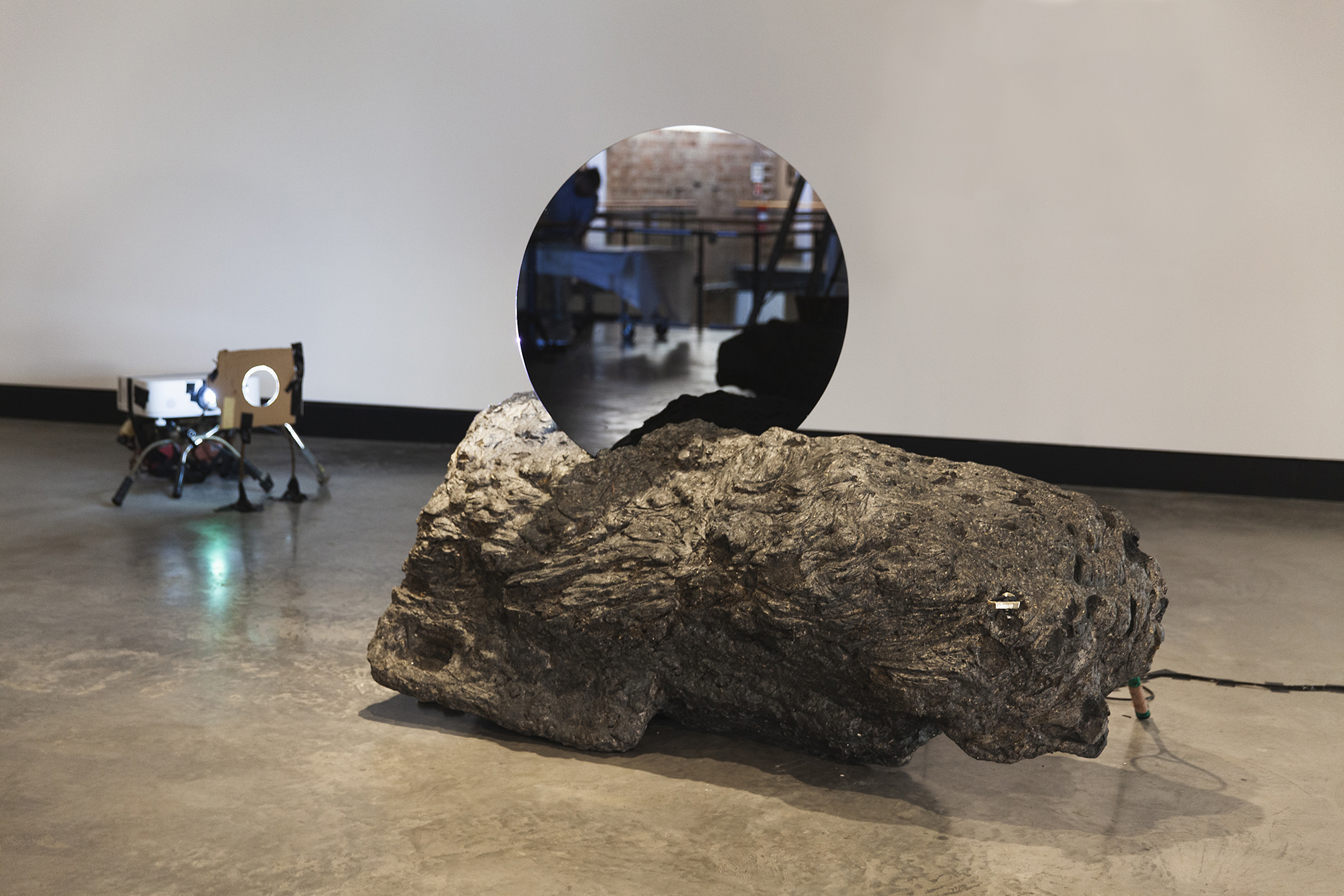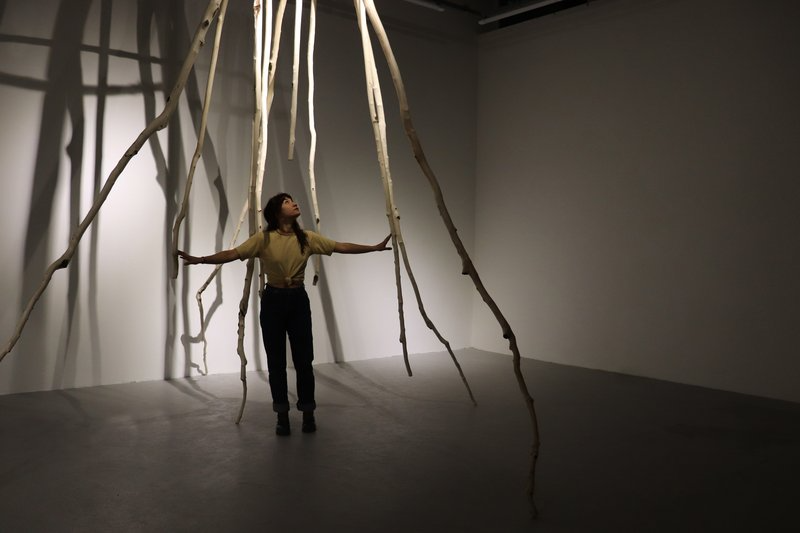Dr Judith Crispin, a descendant of the Bpangerang people of north-east Victoria, is a poet and visual artist currently based in Wamboin, a rural-residential area in the Southern Tablelands of New South Wales. Her practice is centred around lumachrome glass printing, a combination of lumen painting, chemigram and cliche-verre techniques. These alternative photographic methods are augmented in Crispin's work with drawing. She describes her works as a collaboration with Country because most materials are drawn from Country. Crispin will use the $10,000 scholarship to make a visual literary portrait of Millewa, the Murray, where it passes through the country of her ancestor Charlotte Clark.

Turner-Carroll is a Queer, Australian artist of Burmese descent, currently based in his hometown Lovedale, on the lands of the Wonnarua people. Through photography, sculpture, installation and performance, Turner-Carroll explores the interaction between the human and non-human world, making work that can "...sing to snakes, signal with extra-terrestrials, and barter with islands, rivers, and oceans." Turner-Carroll has been awarded the Windmill Trust Scholarship to develop a body of work for a solo exhibition at Newcastle Art Gallery (NAG) from Seprember 2026 to January 2027. This work will consider the implications of the resurgence of global interest in space travel.

Karla Dickens is a Wiradjuri woman living and working in Goonellabah, on Bundjalong country in New South Wales. She is a multidisciplinary artist who interrogates aspects of the naiotn's history, providing provocative reflections on Australian culture as well as explorong religion, race, sexuality, the environment and motherhood. A graduate from the National Arts School, Dickens has exhibited extensively nationally and internationally, with works represented in a number of significant public collections. The Windmill Trust Scholarship will enable Dickens to create new works for an exhibition at Wollongong Art gallery in April 2025.

Ellen Ferrier is an installation based artist in the Northern Rivers region of NSW. Exploring the possibilities of traditional and emergent sustainable materials and technologies, she creates speculative objects and architectures as propositions for a future built on an ethics of care, connection and reciprocity. Ferrier will use the $10,000 scholarship to fund material investigations and fabrication of her work for Cementa24 - an immersive installation featuring experimental eco-cements made with problematic plant species for Kandos, a town established and made famous for its cement production.

Juanita McLauchlan is a Gamilaraay woman living on Wiradjuri country in Wagga Wagga. McLauchlan's new body of work drawing upon her Gamilaraay identity and family history to explore family connections through body adornment. The result is a major solo exhibition at Wagga Wagga Gallery in May 2023.
An experienced printmaker McLauchlan's proposal involved developing ideas and techniques incorporating textiles and sculpture to find new ways to explore her Aboriginal heritage through her practice.

 Debbie Taylor-Worley is a Gamillaraay woman originally from north-west NSW and now based on the Tweed Coast. Her practice ranges from works on paper, canvas and ceramics with an emphasis on utilising natural pigments, dyes, ocean water, ochres and resins. Driven to reconnect with her heritage after the birth of her daughters, Taylor-Worley’s artwork honours the powerful carved trees (dendroglyph) of her Country, many of which have been destroyed in the colonial pursuit of agricultural land.
Debbie Taylor-Worley is a Gamillaraay woman originally from north-west NSW and now based on the Tweed Coast. Her practice ranges from works on paper, canvas and ceramics with an emphasis on utilising natural pigments, dyes, ocean water, ochres and resins. Driven to reconnect with her heritage after the birth of her daughters, Taylor-Worley’s artwork honours the powerful carved trees (dendroglyph) of her Country, many of which have been destroyed in the colonial pursuit of agricultural land.
Image: Debbie Taylor-Worley, Beyond Gavrinis, 2018, installation view. Canvas and mixed media (100x180) clay, sand. Photo by Andrew Willis.
Dale Collier is based in Newcastle, one of Australia's largest port cities with train and songlines escalating all the way back out through red dirt country. He works across all disciplines of sound video, performance, and installations while examining contemporary roles of First Nations artist, activist, and ally.
Dr Fiona Foley is a leading contemporary Australian artist with a practice encompassing painting, printmaking, photography, sculpture, mixed-media work, found objects and installation to examine and dismantle historical stereotypes. Fiona will use the $10,000 scholarship to travel to her traditional Badtjala country surrounding Hervey Bay and Fraser Island to create a new series of gouache paintings on watercolour paper.
Rachel Peachey and Paul Mosig with their children Sascha and Jack collaborate using photography, video, textiles, sculpture and found objects to look at human / environment relationships and the idea of artist as both maker and curator.
Duke Albada is a multi-disciplinary artist with a focus on socially engaged practice. Her work explores relationships within communities, surveying the social and cultural identity in relation to place.
We acknowledge the Traditional Custodians of the lands where we work and live and pay our respects to their Elders past and present.
We celebrate the diversity of the Aboriginal peoples of NSW and their ongoing culture and connections to the lands and waters.
Copyright © Windmill Trust Scholarship 2024 ABN 40 503 187 303
Privacy Policy




